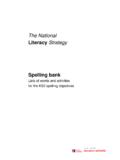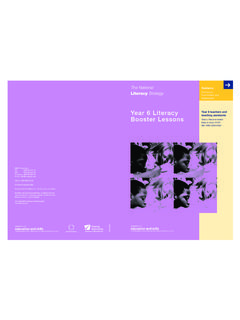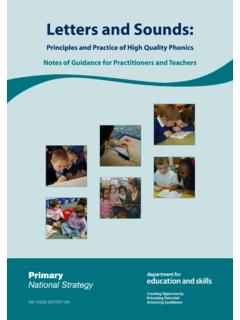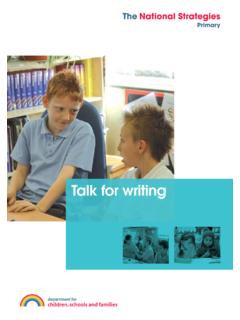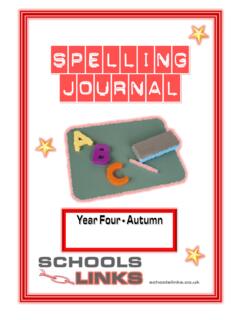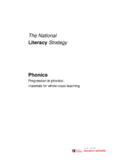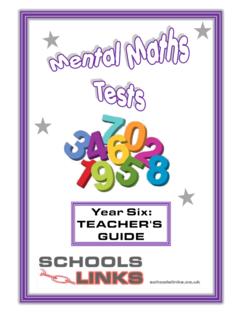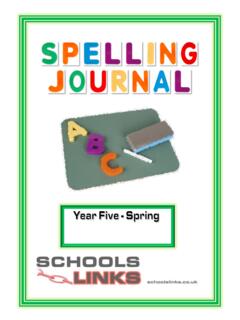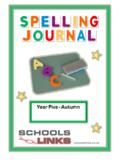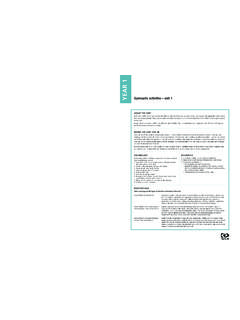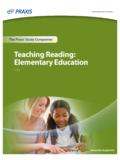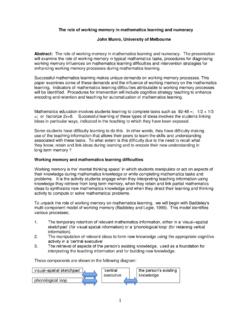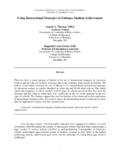Transcription of The National Literacy Strategy - schoolslinks.co.uk
1 The National Literacy Strategy Additional Literacy Support Module 2. Phonics and Spelling Reading (Guided and Supported). Writing (Shared and Supported). Department for Education and Employment The National Literacy Strategy Additional Literacy Support Module 2. Phonics and Spelling Reading (Guided and Supported). Writing (Shared and Supported). Department for Education and Employment The National Literacy Strategy Additional Literacy Support MODULE 2. Phonics and Spelling Reading (Guided and Supported).
2 Writing (Shared and Supported). First published 1999. Reprinted 2000. Contents Foreword by Professor Michael Barber 4. National Literacy Strategy : Additional Literacy Support (ALS) 5. Phonics and Spelling 14. Phonic Games and Activities 16. Tricky Words 36. Lesson Plans 38. Photocopy Masters 55. Sentence Sheets Story 2: The Aliens meet the family 91. Reading (Guided and Supported) 107. Guide Sheets 110. Writing (Shared and Supported) 113. Lesson Plans 114. Photocopy Masters 122. Example Lesson Scripts 137.
3 Making a Sentence Holder 151. Appendix 1. Guidance for classroom assistants: management of group behaviour 152. Appendix 2. Assessment flowchart: placing a child on the ALS programme 153. Appendix 3. Homework activities 154. Appendix 4. Glossary of terms 155. Appendix 5. Phonemes 160. 3. Foreword The Literacy Hour is now well established and having a positive impact in primary schools. This should ensure that all pupils receive good quality Literacy teaching from the time they start school. Pupils who are already in Key Stage 2 will not, however, have been taught the Literacy Hour from the beginning of primary school, and many would now benefit from further support.
4 The purpose of Additional Literacy Support (ALS) is to help pupils in Key Stage 2 who have already fallen behind in Literacy , but who would not otherwise receive any additional support in this area. This pack includes a high quality teaching programme for such pupils, to be delivered during the group work session of the Literacy Hour by teachers and classroom assistants, working in partnership. Classroom assistants have a key role in delivering ALS. The programme offers them training and a set of structured teaching materials to help them make a significant impact on standards in the classroom.
5 The Government is funding an additional 2,000. (full-time equivalent) classroom assistants in 1999 2000 to deliver ALS in schools. This is a first step to meeting its pledge to provide an additional 20,000 assistants by 2002. Evaluation of ALS will inform decisions about this wider deployment of classroom assistants. I hope that schools find these materials useful in ensuring that we succeed in raising standards of Literacy for all pupils. Professor Michael Barber Head of Standards and Effectiveness Unit 4.
6 National Literacy Strategy : Additional Literacy Support (ALS). Introduction to ALS. The National Literacy Strategy gives all pupils a basic entitlement to good quality Literacy teaching . In the early stages of the Strategy , however, pupils in Key Stage 2 will not usually have benefited from being taught the Literacy Hour, using the objectives in the Literacy Framework for teaching , from the beginning of primary school. Schools have been sent guidance, supported by funding from the Standards Fund, to help teachers ensure that Year 6 pupils in the early stages of the Strategy reach their full potential in the Key Stage 2 tests.
7 ALS is intended to help pupils in the earlier part of Key Stage 2 who have already fallen behind in Literacy . The Government's target of 80% of 11-year-olds achieving Level 4 in English in 2002 is a milestone on the way to virtually all children attaining this standard. ALS reinforces this long-term aim by helping teachers to ensure that all children get the teaching they require to reach Level 4, not just those who can more easily be moved from Level 3 to Level 4. Funding to support the programme has been allocated to LEAs in 1999 2000 by a formula that takes into account pupils' achievement in the Key Stage 1 tests.
8 ALS thus gives extra support to each LEA in achieving its target, recognising their different starting points. ALS is designed to be delivered by teachers and classroom assistants, working in partnership. Which pupils will benefit from ALS? A number of teachers have found it helpful to incorporate work from earlier years in the Framework into Literacy hours at Key Stage 2. But some pupils may need more than this to ensure that they develop fully the skills they will need to master reading and writing by age 11.
9 Most of these pupils are likely to be Year 3 and 4 pupils who have attained Level 2C. or Level 1 in their Key Stage 1 English tests. ALS is intended to be delivered during the group work sessions of the Literacy Hour, and the content of the teaching programme is aligned to the objectives in the Literacy Framework for teaching . Some pupils who have fallen behind in Literacy may already receive extra support. ALS. is mainly intended for pupils who would, without it, receive no additional support in Literacy , pupils assessed at level 2C and reluctant and disaffected pupils.
10 Schools will, of course, be best placed to make the detailed decisions, within this context, on which pupils are most likely to benefit from the programme. It may, for example, be appropriate to use ALS to give extra specific help to pupils who already receive some additional support, such as those with more severe SEN, pupils who speak English as an additional language (especially if 1 Standards at Key Stage 1. they have only recently arrived in this country) and traveller children. English and mathematics and Standards at Key Stage 2.
